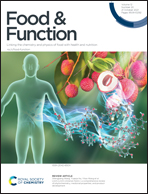Amentoflavone inhibits tumor necrosis factor-α-induced migration and invasion through AKT/mTOR/S6k1/hedgehog signaling in human breast cancer†
Abstract
Inflammatory cytokine tumor necrosis factor-α (TNFα) has been demonstrated to accelerate the progression and metastasis of various carcinomas. In this study, we investigated the effect of amentoflavone on inhibiting the migration and invasion of TNFα-induced breast cancer cells. Results showed that amentoflavone significantly blocked the cellular migration and invasion of MCF10DCIS.com and MDA-MB-231 cells at a concentration of 10 μM but did not affect the cell viability. The mRNA and protein levels of matrix metalloproteinase (MMP)-9, significantly activated by TNFα, were reversed by amentoflavone treatment in a dose-dependent manner in MCF10DCIS.com cells. Congruent with the protein level, the activity of MMP-9 was significantly suppressed by amentoflavone treatment. Additionally, we found that amentoflavone dampened Gli1-dependent noncanonical hedgehog signaling, which is a key factor in the regulation of migration and invasion in TNFα-induced human breast cancer cells. Further study elucidated that TNFα enhanced Gli1 through the activation of the AKT/mTOR/S6K1 cascade, whereas it receded after amentoflavone treatment in human breast cancer cells. In summary, amentoflavone abrogated Gli1 activation in TNFα-induced mammary tumor cells, resulting in a decrease of invasiveness in human breast cancer cells via mediating AKT/mTOR/S6K1 signaling. Amentoflavone should be considered as a potent food ingredient for the retardation of mammary tumorigenesis.



 Please wait while we load your content...
Please wait while we load your content...